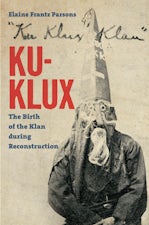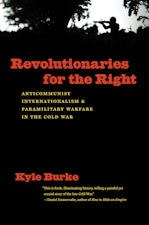Gun Country
Gun Capitalism, Culture, and Control in Cold War America
By Andrew C. McKevitt
336 pp., 6.125 x 9.25, 20 halftones, notes, index
-
Paperback ISBN: 978-1-4696-7724-8
Published: November 2023 -
Hardcover ISBN: 978-1-4696-7496-4
Published: November 2023 -
E-book EPUB ISBN: 978-1-4696-7497-1
Published: September 2023
Buy this Book
- Paperback $24.95
- Hardcover $99.00
- E-Book $17.99
For Professors:
Free E-Exam Copies
Awards & distinctions
One of the Washington Post's Notable Nonfiction Books of 2023
When gun control legislation emerged in the 1960s, many Americans, accustomed to the unregulated postwar bounty of cheap guns and fearful of Soviet invasion, domestic subversion, and urban uprisings, fiercely challenged it. Meanwhile, gun control groups were diverted from their abolitionist roots toward a conciliatory, fundraising-focused strategy that struggled to limit the stockpiling of firearms. Gun Country recasts the story of guns in postwar America as one of Cold War and racial anxieties, unfettered capitalism, and exceptional violence that continues to haunt us to this day.
About the Author
Andrew C. McKevitt is John D. Winters Endowed Professor of History at Louisiana Tech University. He is the author of Consuming Japan: Popular Culture and the Globalizing of 1980s America.
For more information about Andrew C. McKevitt, visit
the
Author
Page.
Reviews
“Sharp, fascinating, devastating, exhaustively researched and often wryly funny, this indispensable book — one of the best works of nonfiction this year — details how America came to be not just a gun country but the gun country.”—Becca Rothfeld, Washington Post Book World
"Illuminating, timely . . . . an original way of understanding a stunning and enduring increase in gun ownership in the US . . . . McKevitt offers a compelling argument about where the extremity of America’s permissiveness toward deadly weaponry originated and how debates on the Second Amendment’s meaning have evolved in response to shifting cultural preoccupations. He also makes a persuasive appeal for how the human costs of mass gun ownership could be mitigated."—Kirkus Reviews
"By focusing on how guns have been marketed and how the right to buy one has been mythologized, McKevitt provides an illuminating diagnosis of our current political pathology."—Ron Charles, Washington Post
"Andrew McKevitt’s excellent Gun Country. . . insists on an often neglected fact: guns are a commodity."—Geoff Mann, London Review of Books
"Riveting and original. Gun Country goes beyond well-worn debates about the Second Amendment—and outside America's borders—to trace the evolution of the nation's obsession with firearms. The result is both clarifying and chilling. Anyone who cares about gun violence in the United States must read this book."—Nicole Hemmer, author of Partisans: The Conservative Revolutionaries Who Remade American Politics in the 1990s
"This is a superb and necessary book. The historical research is rigorous, the argument both bold and nuanced, the prose clear and elegant. This is an innovative study of modern American consumerism as well as an inventive work of cultural and political history. McKevitt invokes powerful explanatory concepts (i.e., 'gun capitalism'), introduces a wide range of indelibly drawn characters, and carefully re-creates a series of key, but largely unknown, historical moments that shed light on the critically important question of how the United States became a 'gun country.'"—Lawrence B. Glickman, author of Free Enterprise: An American History



